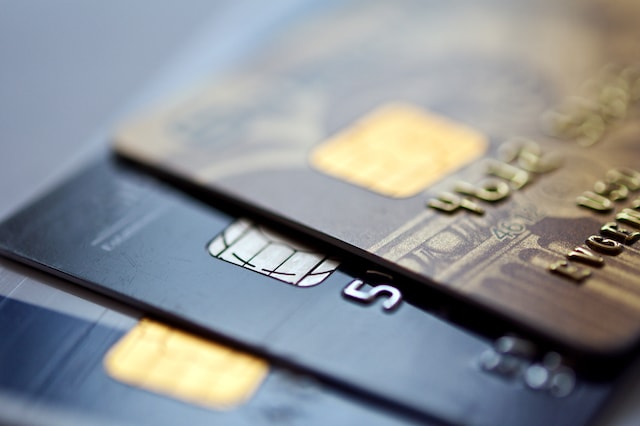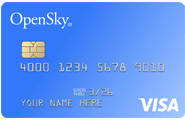So what is a secured credit card? A secured credit card is a type of card that requires you to put down a deposit, usually equal to the amount of what your line of credit or credit limit will be.
If you make timely payments and keep your balance low over time, this can help build up your credit.
People often use secured cards as an alternative when they have bad or no credit as they require less upfront risk for the card company than many line of credit options available.
This article discusses what you need to know about these credit entry or reentry card options, how secured credit cards work, who uses a secured credit card account, how they can build credit, their pros and cons, and other related topics.
Let’s dive in!
Table of Contents
What Is a Secured Credit Card?
A secured credit card is a type of credit card that requires you to put down an upfront cash deposit, usually equaling the amount of your credit limit.
This cash security deposit helps to protect the credit card company from recognizing a loss by issuing you a credit card, and then you failing to make payments.
Secured cards typically work best for individuals with no credit or looking to rebuild bad credit. The cash deposit establishes collateral the credit card issuer may claim in the event of default or failure to make on-time payments.
How Do Secured Credit Cards Work?
Often, a secured credit card works as the first step for young adults or people who don’t have an established credit history to have access to credit. They also work for consumers with poor credit.
Secured credit cards work by having the cardholder front a required deposit to open an account, reducing the risk to the credit card issuer of you defaulting or missing a payment.
Usually, minimum deposits are in lower denominations, between $200 to $500 to start. This represents your credit limit and also financial protection for the financial institution issuing the card.
Once you apply for a secured credit card and make the security deposit, these secured credit card options work like any other card.
Where they differ from a traditional credit card comes through requiring a cash deposit upfront (usually a refundable security deposit) and often running no credit check as a result.
Unsecured credit cards don’t require an initial deposit and usually run a credit check to determine eligibility and whether you are likely to use the card responsibly.
A card company may let applicants get automatically considered if their credit profile carries excellent credit or if they apply for a secured card.
Related: 9 Best Credit Cards for No Credit History [Starter Credit Cards]
Who Uses Secured Credit Cards?
Secured cards are often used as a starter credit card for people without credit history or as an alternative for those who have poor credit.
Anyone who has never had a credit card before and has never served as an authorized user on another person’s credit card likely has no credit history and thus no credit scores from major credit bureaus.
A credit card company will often approve an application for someone who has what scoring systems as bad or with limited credit as long as they meet the minimum deposit required along with other terms of that particular issuer’s offering.
People may have earned bad credit from missing payments accidentally or not meeting a minimum payment often enough.
After using a secured card responsibly, cardholders may find the issuing financial institution sees their financial situation in a better light.
They recognize an ability to make credit card payments quickly and may eventually clear the way to another favored line of credit used by millions: unsecured credit cards.
Related: What is Credit Card Piggybacking & Does It Help Credit Scores?
How Can a Secured Card Help Build Credit and Improve Your Credit Score?
When you turn 18, you become eligible to apply for a credit card in your name, though you’ll need to meet certain age and income requirements.
Though, because you’re so young, you might not have the positive credit history that credit card companies want to see—or any credit history at all.
If this is the case, you might consider applying for a secured credit card to establish credit and make on-time payments while keeping your balance low relative to your overall available credit. Secured cards work best for people with no or bad credit.
You’ll need to make an initial deposit that becomes your credit limit to receive an actual credit card, but you will receive a secured card account in your name to build credit.
With enough time, making on-time payments and maintaining an overall good payment history will show you can use the card responsibly. These good credit and personal finance habits should be reported to major credit bureaus, reflecting on your credit report.
If you make timely payments and keep your balance low over time, this can help build up your credit line and scores.
This especially matters for building credit because showing you can make your monthly payments on time and not overuse your credit demonstrates creditworthiness to credit reporting agencies and credit card issuers.
The security deposit keeps skin in the game for you to make good on payments.
Unlike prepaid cards, the security deposit funds don’t load onto your card and do not get directly used for purchases. Instead, this deposit will be forfeited if you fail to pay your credit card bill.
So, if you make your payments on time, your regular spending activity and collateral will help you to build your credit. To provide you more financial flexibility with time, you may opt to move to unsecured card issuers’ options.
Related:
- Joint Credit Cards: Can They Be a Good Way to Build Credit?
- Banking Apps for Kids and Teens [How Minors Can Bank]
What Does a Credit Card Issuer Evaluate for Approving a Secured Credit Card Application?
While it’s easier to get approved for secured cards than unsecured credit cards, not everybody gets approved. There are several factors lenders consider when looking over a secured credit card application.
Credit bureaus have their own complex credit score algorithms that may factor in your credit history (if you have any). Your application might be turned down if you have any of the following:
- Bankruptcy on your record
- No verified income or too low of an income
- Insufficient funds to cover the deposit
- A long history of missed payments
- A deficient score
You might also get denied if you don’t meet credit card and bank age requirements. If the company rejects your secured card application, the credit card company will usually provide you with the reason(s).
You have a legal right to this information, so if you aren’t told why you weren’t approved, make sure to ask. It’s possible you just filled out your application incorrectly.
If you still aren’t approved because of your poor credit history, all hope isn’t lost. See if a close friend or family member with a good credit history would be willing to be a cosigner on your card.
A cosigner would also be responsible for your debt, making your application more likely to be approved.
However, if you aren’t confident in your ability to make your payments, it’s not wise to get another person to cosign but instead build your credit up in other ways before reapplying.
Related: 5 Ways to Build Credit as a College Student: What to Know
Pros and Cons of Secured Credit Cards
While there are many benefits to getting and using secured credit cards, there are a few disadvantages.
Whether or not a secured card is a good idea for you depends mainly on your current financial situation and how responsible you consider yourself.
Pros
- Easy to get: You’re much more likely to be approved for a secured card than an unsecured one.
- No annual fee: A secured card often doesn’t have annual fees and is free to use (except for your refundable deposit). No annual fee can also make these good to hold on to for more extended periods to show you can control your access to credit while applying for other credit card options to build a diversity of credit.
- Builds credit history: A secured card is one of the quickest ways to create a credit history. Credit history can be necessary for getting car loans, an apartment, insurance, and more.
- Can raise your credit score: If you have a low score, making regular payments to a secured card can show you’re reliable, increase your credit score and lead to a higher credit line. A higher credit score may be what you need to become approved for an unsecured card, which has additional benefits. However, if you are irresponsible with the card, it won’t help increase your score or improve your chances of getting unsecured cards.
Related: Best Credit Cards for Kids: Building Credit & Money Habits Early
Cons
- Requires a deposit: You have to pay a security deposit on a secured card. If it’s challenging for you to save a few hundred dollars that you won’t get back right away, this could be tricky.
- Secured cards don’t offer rewards: While it does happen, it’s infrequent for a secured card to offer rewards. If you qualify for unsecured cards, you might have the ability to earn cash back and other benefits that you’re missing out on with a secured card.
- High fees and interest rates: Depending on which secured card you choose, there may be fees, such as an application or processing fee. Just like with a traditional card, if you don’t make payments, you incur interest. Secured credit card accounts usually have very high-interest rates, meaning missing too many payments could cost you a significant amount of money.
- Low credit limits: Secured cards typically have low credit limits. If you max out your card, it might hurt your ability to get an unsecured card in the future, alongside lowering your credit score. You want to have a low credit utilization ratio calculated by dividing your credit card balances by your available credit lines. When your credit limit is low, you need to keep your usage amount equally low and not use your card for any major purchases.
Related: How Parents Can Help Their Children Start to Build Credit
How and When Do I Switch to an Unsecured Credit Card?
A secured credit card is meant to be temporary and used as a stepping stone towards getting an unsecured credit card.
Once you build a positive credit history and demonstrate you can make regular payments on time, you might be able to switch over without any problems.
While there is no specific time frame for switching or what your score needs to look like before doing so, it’s wise not to wait too long as an unsecured card could come with additional benefits that your secured card doesn’t.
Some card companies will automatically review your account to see if it’s time for you to switch over to a secured card.
Not all card issuers check automatically. If yours doesn’t, you can call and inquire if you’re able to transition into another card or if you should apply for an unsecured one.
When applying for an unsecured card, there may be a pull to your credit, which means that your credit score might temporarily take a slight dip.
Credit experts generally don’t recommend closing credit cards if you have a thin credit file, but this is considered an exception.
Once you’ve received approval for an unsecured credit card, most people close their secured one. You can then have your deposit returned as well.
Related: Best Credit Cards for Students with No Credit
Secured Credit Cards vs. Prepaid Debit Cards
Secured credit cards and prepaid debit cards are similar in that they both require money to use the card. However, that money is used for different purposes.
A prepaid card works similarly to a gift card, except you can use it anywhere debit cards are accepted. The money you put on it upfront is used to pay for charges.
For example, if you loaded a prepaid card with $200 and then bought something for $20, the card would have $180 remaining.
The money you pay for a secured credit card is used as a security deposit. If your deposit was $200 and you bought something for $20, you would receive a bill for $20 and any other purchases you made that cycle.
As long as you pay all your bills (either on time or with the accumulated interest), you can get your security deposit back.
Related:
- Best Debit Cards for Teens
- Best Debit Cards for Kids
- Best Prepaid Debit Cards for Teens & Families [Reloadable]
- Best Free Debit Cards for Kids & Teens [Save, Spend & Earn]
Can I Get My Security Deposit Back?
Yes, you can get your full security deposit back as long as you’ve paid any outstanding balances on your secured credit card and you close your account.
If you have outstanding balances, that outstanding amount gets deducted from your refund.
Alternatively, rather than closing your account, you may upgrade to an unsecured credit card. In that situation, you would also get your security deposit back.
The only time you wouldn’t get your security deposit back is if you don’t pay off your entire spending balance. Timing for when you receive your deposit back varies depending on the issuer.
Related: Best Credit Cards for Kids
Best Secured Credit Cards
1. OpenSky® Secured Visa® Credit Card
The OpenSky® Secured Visa® Credit Card requires no credit check (no minimum credit score required) and offers a refundable deposit* that becomes your credit line limit on your Visa® Card.
The OpenSky® Secured Visa® Credit Card reports to all three major credit bureaus, allowing you to build credit. You can use the dedicated credit education page from OpenSky® to learn more about improving credit scores and how to manage starter credit cards wisely.
- New feature! Earn up to 10% cash back* on everyday purchases
- No credit check to apply. Zero credit risk to apply!
- Looking to build or rebuild your credit? 2 out of 3 OpenSky cardholders increase their credit score by an average of 41 points in just 3 months
- Get free monthly access to your FICO score in their mobile application
- Build your credit history across 3 major credit reporting agencies: Experian, Equifax, and TransUnion
- Add to your mobile wallet and make purchases using Apple Pay, Samsung Pay and Google Pay
- Fund your card with a low $200 refundable security deposit to get a $200 credit line
- Apply in less than 5 minutes with their mobile first application
- Choose the due date that fits your schedule with flexible payment dates
- Fund your security deposit over 60 days with the option to make partial payments
- Over 1.4 Million Cardholders have used the OpenSky Secured Credit Card to improve their credit
*See Rewards Terms and Conditions for more information
* The refundable deposit you make when opening your account is important, because it means you can open an account without a credit check. Your security deposit is returned to you once your credit card account is closed and the balance is paid in full. OpenSky may use your security deposit to expedite the pay down of your outstanding balance. Please refer to the Cardholder Agreement for additional details related to the security deposit.
2. Capital One Platinum Secured Credit Card
The Capital One Platinum Secured Credit Card by Mastercard from Capital One offers no annual fees and instant credit approval, meaning you can get a credit card in seconds.
You put down a refundable deposit starting at $49 to get an initial $200 credit line. With enough responsible card use, you could earn back your security deposit as a statement credit.
You can also be considered for a higher spending limit in as little as six months without an additional deposit required.
3. Self – Credit Builder Account + Secured Visa® Credit Card
The Self – Credit Builder Account + Secured Visa® Card acts as a product pairing focused on building your credit. With the credit builder account, you can have payments reported to all three credit bureaus.
The card requires a $100 minimum security deposit and charges a $25 annual fee. There is no minimum credit score required because this is a secured credit card.
4. Citi® Secured Mastercard
The Citi® Secured Mastercard is a no annual fee card aimed at helping you to build credit when used responsibly.
A $200 minimum security deposit opens your account and will be equal to your credit limit.












![How to Get Free Money Now [13 Ways to Earn Money Today] 18 how to get free money](https://youngandtheinvested.com/wp-content/uploads/how-to-get-free-money-600x403.jpg)

![8 Best Debit Cards for Teens [Reviewed by a CPA + Father] 20 best debit cards for teens hires](https://youngandtheinvested.com/wp-content/uploads/best-debit-cards-for-teens-hires-600x403.jpg)
